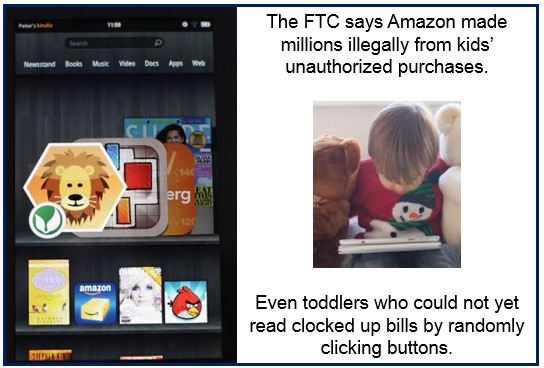Federal regulators sue Amazon for illegally charging account holders for kids’ purchases without their consent. The lawsuit alleges that the online retail giant allowed children to buy virtual items, such as “stars”, “acorns” or “coins” in Kindle Fire games among others to the tune of millions of dollars without the approval of the account holder.
The complaint, filed by the Federal Trade Commission (FTC), cites internal Amazon documents in which employees express concern regarding unlimited in-app purchases without a password requirement.
FTC Chairwoman Edith Ramirez, said:
“Amazon’s in-app system allowed children to incur unlimited charges on their parents’ accounts without permission. Even Amazon’s own employees recognized the serious problem its process created.”
“We are seeking refunds for affected parents and a court order to ensure that Amazon gets parents’ consent for in-app purchases.”
Amazon says it has already refunded parents who complained.
Parents had to pay unauthorized purchases
The complaint, filed in the U.S. District Court for the Western District of Washington, says that when Amazon introduced in-app charges to its Appstore in November 2011, there were no procedures in the in-app purchasing process that required a password. Parents or account holders had to foot the bill for purchases in kids’ games that they had not authorized.
The complaint alleges that the kids’ games frequently encourage children to obtain virtual items “in ways that blur the lines between what costs virtual currency and what costs real money.”
For example, in the app “Ice Age Village”, the FTC noted that kids can use “acorns” or “coins” to purchase items within the game without a real-money charge. However, they can also buy extra “acorns” and “coins” using real money on a display that is visually very similar to the non-real money page. Prices within the app can be as high as $99.99 for the largest quantity purchase.
Amazon staff were concerned
The FTC quotes an internal communication among Amazon staff in which one employee comments that allowing the no-password unlimited in-app charges to carry on was “…clearly causing problems for a large percentage of our customers …(the situation is) near house on fire.”
The complaint says that Amazon updated its in-app charge system in March 2012 to require a password only for items costing more than $20. Children were still allowed to buy as many items as they wanted without parental approval, as long as they cost less than $20.
The FTC cites an Amazon employ who wrote at the time of the change that “it’s much easier to get upset about Amazon letting your child purchase a $99 product without any password protection than a $20 product.” Further Amazon staff internal email comments about a “house on fire” situation in July 2012 were mentioned in the complaint.
The system was updated in early 2013, but during the in-app charge process to require password entry for several products, an undisclosed window opened up for up to one hour during which unlimited no-password purchases could be made.
It wasn’t until June 2014, when the FTC voted to approve the lawsuit against Amazon, that the online retailer changed its in-app charge framework requiring informed consent by the account holder for in-app charges on its new mobile devices.
The FTC seeks full refunds for affected parents.
Millions of dollars in “ill-gotten gains”
The FTC says that thousands of Amazon account holders complained about in-app charges incurred by their children without their authorization, totaling millions of dollars of charges.
The complaint gives as an example one mother who received a bill for $358.42 in unauthorized charges. Even children who could not yet read could clock up sizable bills by randomly clicking buttons.
All in-app charges are “final and non-refundable”, Amazon’s policy states.
The FTC wrote:
“Even parents who have sought an exception to that policy have faced a refund process that is unclear and confusing, involving statements that do not explain how to seek refunds for in-app charges or suggest consumers cannot get a refund for these charges.”
This is not the first case the FTC has complained about. Earlier this year, in a case relating to children’s in-app purchases, Apple Inc. agreed in a settlement to refund $32.5 million to account holders whose children had made unauthorized purchases through iPad and iPhone apps. Apple also settled a class-action suit on the same issue.
The FTC says it is seeking a full refund for all affected account holders, disgorgement of Amazon’s ill-gotten gains, “and a court order ensuring that in the future Amazon obtains permission before imposing charges for in-app purchases.”
Amazon.com is based in Seattle, Washington. The company employs more than 117,000 people worldwide.


